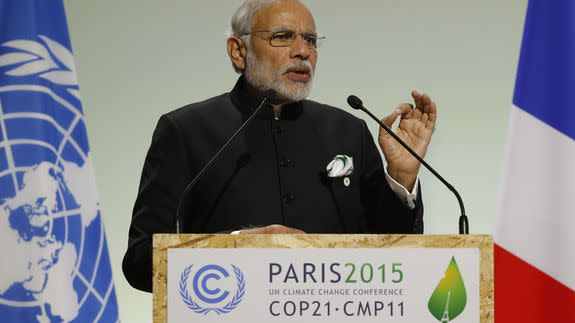India to ratify Paris Agreement climate pact on Oct. 2

Prime Minister Narendra Modi said India will ratify the Paris Agreement climate change pact on Oct 2.
SEE ALSO: The Paris climate agreement just took a big step toward becoming international law
Modi’s announcement on Sunday is seen as a major boost to the implementation of measures at international level in an attempt to control global warming. Modi added that the country has chosen Oct. 2 to coincide with the birth anniversary of Mahatma Gandhi, who lived his entire live with minimum carbon footprint.
"There is one work left in the CoP21 (Conference of Parties). Ratification is yet to be done and India too is yet to do it. Today on the birth anniversary of Deen Dayal Upadhyay, I announce that India will ratify the decisions on October 2, the birth anniversary of mahatma Gandhi," Modi said.
More than 190 nations have agreed on regulating global warming and helping poor nations that face climate catastrophe. The participating countries are expected to come up with plans to limit greenhouse gas emission by the end of the year. They will aim to keep global temperature rise to below 2-degree Celsius this century.
India’s stand on the Paris Agreement has been critical as it alone accounts for 4.5 percent of all global greenhouse gas emissions. For the Paris Climate Agreement to come into effect, at least 55 percent of the participating nations accounting for 55 percent of all global greenhouse gas emissions need to ratify it.
The Indian government took additional time to announce its stand because it wanted to complete some projects. These projects, many of which are heavily relying on usage of fossil fuels, will need amendments when the country complies with the Paris Agreement climate pact guidelines.
Modi’s announcement came as a surprise to many, especially since the Indian government refused to commit to the Paris Agreement earlier this year at G20 summit. But India also risked losing the advantage of first-mover, letting China and the U.S. set rules with their best interest in mind, according to Hindustan Times.
The United States welcomed India’s take on Paris Agreement.
We welcome the news India will join the #ParisAgreement Oct 2. Congrats Prime Minister @narendramodi for your leadership to #ActOnClimate
— Rich Verma (@USAmbIndia) September 25, 2016
